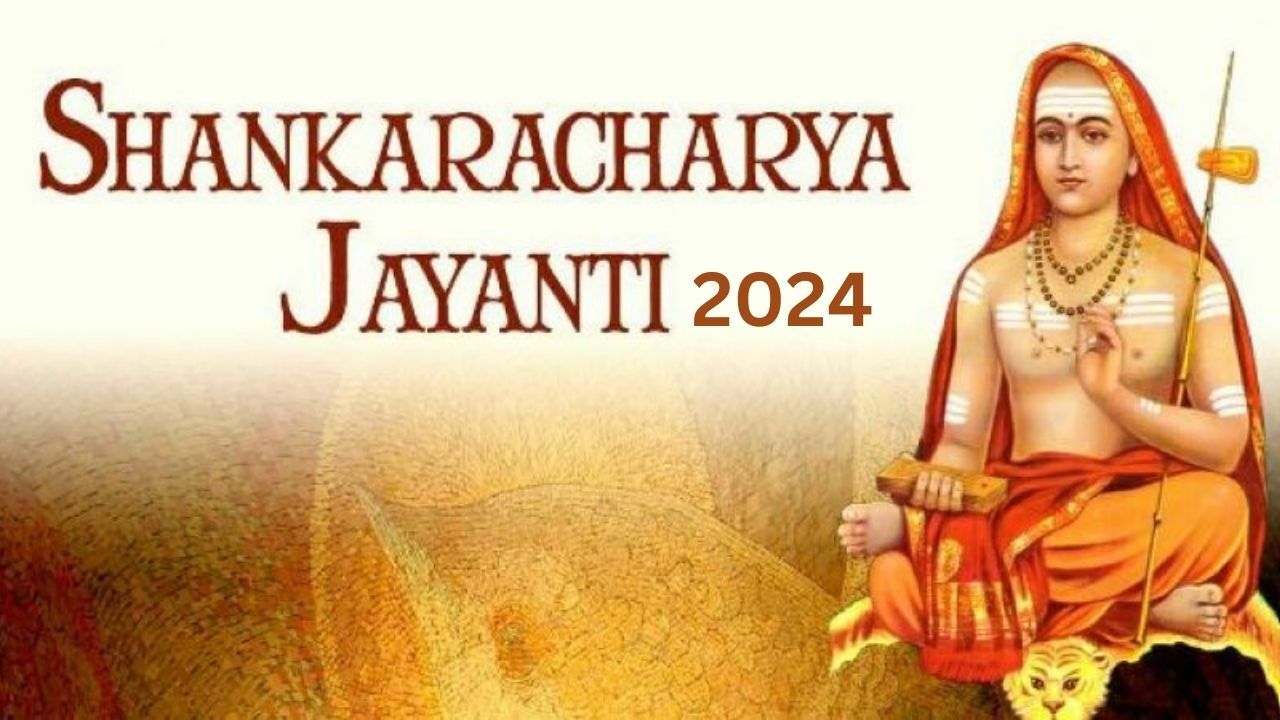"Adi Shankaracharya: Enlightened Sage of Advaita Vedanta"
Introduction:
- Adi Shankaracharya, also known as Jagadguru Shankaracharya, is a towering figure in the history of Indian philosophy and spirituality. His contributions have had a profound impact on the way Hinduism is understood and practiced today. As we commemorate Adi Shankaracharya Jayanti, let us delve into the life, teachings, and enduring legacy of this revered saint.
Early Life and Education:
- Adi Shankaracharya was born in the early 8th century CE in the village of Kaladi, Kerala. Legend has it that his birth was divinely ordained, and his parents, Sivaguru and Aryamba, were devout followers of Lord Shiva. From a young age, Shankara showed exceptional intellectual prowess and a deep inclination towards spiritual pursuits.
- Under the guidance of his guru, Govinda Bhagavatpada, Shankara mastered the scriptures and delved into the intricacies of Vedanta, Advaita Vedanta in particular. His keen intellect and unwavering devotion earned him the title of Shankaracharya, meaning the "establisher of the doctrine of Shankara."
Philosophical Contributions:
- Adi Shankaracharya's philosophy is primarily based on Advaita Vedanta, which asserts the non-dual nature of reality. According to Advaita, Brahman, the ultimate reality, is devoid of any attributes and distinctions. It is the substratum of the universe, transcending time, space, and causation. Shankara's teachings emphasize the unity of the individual soul (Atman) with Brahman, stressing that the apparent multiplicity of the world is an illusion (Maya).
- In his numerous commentaries (bhashyas) on the Upanishads, Bhagavad Gita, and Brahma Sutras, Shankara elucidated the principles of Advaita Vedanta with unparalleled clarity and depth. He engaged in vigorous debates with scholars of rival philosophical schools, championing the cause of monism and refuting dualistic interpretations of reality.
Legacy and Influence:
- Jagadguru Shankaracharya impact extended far beyond the realm of philosophy. He revitalized the Hindu tradition by establishing four monastic centers (mathas) in different corners of India—Sringeri in the south, Dwarka in the west, Puri in the east, and Badrinath in the north. These mathas served as hubs of learning and spiritual practice, preserving and propagating the teachings of Advaita Vedanta.
- Jagadguru Shankaracharya also undertook extensive travels across the subcontinent, engaging in philosophical discourses, and initiating disciples into the monastic order. His efforts played a crucial role in unifying the diverse strands of Hinduism and fostering a sense of religious harmony and intellectual rigor.
- Jagadguru Shankaracharya tradition continues to thrive to this day, with each successive pontiff inheriting the mantle of spiritual leadership and scholarship. The Shankaracharyas are revered as the spiritual heads of their respective mathas, guiding millions of devotees on the path of self-realization and service to humanity.
Adi Shankaracharya Jayanti:
- Adi Shankaracharya Jayanti, also known as Shankara Jayanti, is celebrated with great fervor and devotion by followers of Advaita Vedanta. It falls on the fifth day (Panchami) of the bright half of the lunar month of Vaisakha (April-May). On this auspicious occasion, devotees offer prayers, recite hymns, and engage in acts of charity and selflessness.
- The significance of Adi Shankaracharya Jayanti lies in commemorating the life and teachings of this illustrious sage who illuminated the path of spiritual enlightenment for generations to come. It serves as a reminder of the timeless wisdom contained in Shankara's works and the enduring relevance of his message in the modern world.
Conclusion:
- Adi Shankaracharya stands as a beacon of knowledge, compassion, and enlightenment in the annals of Indian philosophy. His profound insights into the nature of reality, coupled with his tireless efforts to propagate the teachings of Advaita Vedanta, have left an indelible mark on the spiritual landscape of India and beyond.
- As we celebrate Adi Shankaracharya Jayanti, let us reflect on the timeless wisdom of this great saint and strive to imbibe his teachings in our lives. May his legacy continue to inspire seekers of truth and seekers of the divine for centuries to come.
FAQs:
When was Shankaracharya Jayanti in 2024?
- Shankaracharya was born on Panchami Tithi of Shukla Paksha in the month of Vaishakha in 788 CE. i.e., 12 May 2024.
When was Adi Guru Shankaracharya born?
Adi Shankaracharya's birth dates according to various monasteries are as follows:
- Dvārakā: 491 BCE
- Jyotirmath: 485 BCE
- Jagannatha Puri: 484 BCE
- Sringeri: 483 BCE
According to the Kanchi Peetham, Adi Shankara was born in Kali 2593, which corresponds to 509 BCE.
Where did Shankaracharya died?
- Jagadguru Adi Shankaracharya, whose lifespan is traditionally believed to be from 788 to 820 CE, was born in Kaladi, Kerala. He embarked on extensive spiritual journeys across India, traveling the length and breadth of the country three times. He passed away at the age of 32 in Kedarnath.
When did Shankaracharya born and died?
- Adi Shankaracharya was born in Kalady, Kerala, in the year 788 CE. He is said to have disappeared in the year 820 CE at the young age of 32. Adi Shankaracharya Jayanti is observed on Panchami Tithi during the Shukla Paksha of the Vaishakha month.
What language did Adi Shankara speak?
- Sanskrit,Sanskrit is indeed a classical language belonging to the Indo-Aryan branch of the Indo-European languages. It emerged in South Asia after its precursor languages had spread there from the northwest during the late Bronze Age.
Why is Adi Shankaracharya famous?
- Adi Shankara, commonly known as Adi Shankaracharya, was indeed an Indian Vedic scholar and teacher (acharya) who is believed to have lived in the eighth century CE. In his extensive writings, he synthesized the Advaita Vedanta teachings prevalent during his time and provided a cohesive interpretation of the scriptures, offering liberating knowledge of the self.
We hope that you like this content and for more such content Please follow us on our social site and YouTube and subscribe to our website.
Manage your business cash flows and payable/receivables using our Bahi Khata App
